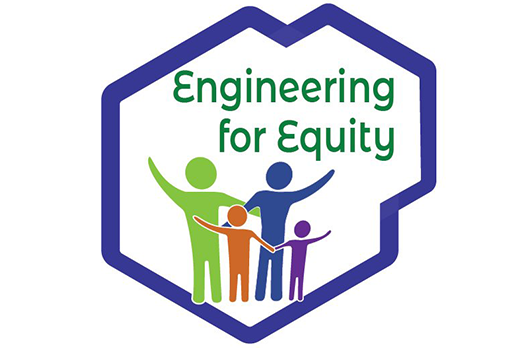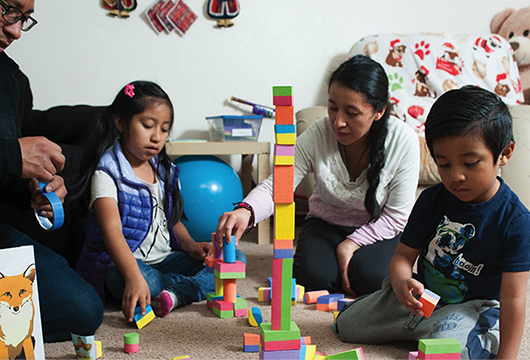TERC Blog
Final Thoughts - Engineering for Equity
“In addition to asking such questions throughout the process of research, we need to consider the actions and activities we can do to engage in genuine equity work. Learning to engage in genuine equity work is not an end goal; it must be seen as an ongoing process and something we can always improve upon.”
(Aguirre et al., 2017, p. 136)
Welcome to the final post in this Engineering for Equity blog series. These last several months have been an intense time of reflection as we tried to synthesize our conversations, readings, and thinking over the last year. It has certainly been a rewarding experience for us. Hopefully some of these ideas have resonated with other educators and researchers grappling with similar issues.
In our field of informal STEM learning, like other fields, there has been a growing interest in deepening relationships with and broadening participation for groups that have been traditionally underrepresented and marginalized in STEM. For example, many of the presentations and discussions during the recent National Science Foundation Advancing Informal STEM Learning Awardee Meeting focused on these topics and provided an opportunity to engage colleagues in conversation about disrupting systems of privilege and oppression.
Still, there is a tremendous amount of work ahead. As we close the blog series, we acknowledge that this is just the beginning of an ongoing learning process for us, our partners, and the families we work with. Engaging in equity work requires constant reflection about our intentions and our actions. Looking back at our writings, approaches, and assumptions from even a few years ago, it’s easy to be critical. And we are sure that in the future this blog series will also feel stale and outdated, revealing biases and assumptions that we have yet to unearth and grapple with. Just as our research knowledge about education and learning continues to evolve, so too must our perspectives, approaches, and methods.
As a final call to action for ourselves and others, we highlight just a few of the outstanding questions that we hope to focus on in the coming years:
-
How do we bring these ideas into practice?
All these equity-focused reflections and ideas are compelling, but they can also feel abstract and removed from everyday practice. The real challenge is to find ways of reshaping our language, tools, and methods to align with these equity perspectives—and most importantly, to put in place systems that will hold us accountable to our goals and the communities we serve. -
How do we shift power dynamics to elevate the knowledge and experiences of families?
Even as researchers and educators focus more efforts on issues of diversity, equity, and inclusion, many of the power dynamics and hierarchies between institutions, families, and communities are unchanged—thus preserving the fundamental structure of who decides and who benefits from this work. How do we shift these dynamics? How do we move away from the paradigm of “fixing” community “problems” that pervades every aspect of the current funding and education system? How do we reposition our roles as researchers and educators in order to create space for families and community members to shape a new vision for equitable STEM education? -
What broader system-level changes are necessary to move these ideas forward?
For all the topics we have taken up during this blog series, we can think of practical steps for ourselves and within our individual projects and studies. But addressing systemic inequities requires system change. At what level of these systems do we choose to work? How do we stay connected to our communities and still advocate for system-level changes? What is our role as researchers and educators in changing these broader systems, including the ones that help preserve our jobs and positions of authority?
In closing, we want to express our gratitude to the many individuals that have shared their time, perspectives, and knowledge to inform this work. This includes our colleagues, Shauna Tominey and Gina Svarovsky, who contributed to several of these blog posts; the members of the Engineering for Equity advisory committee, Christopher Wright, Nelda Reyes, Maria Olivares, and Christine Cunningham; our partners at Mt. Hood Community College Head Start, Metropolitan Family Service, Oregon Museum of Science and Industry, and University of Notre Dame; and the many parents and families that have collaborated with us over the years.
We also want to thank the group of equity scholars that have inspired us with their research and writings, including Megan Bang, Angela Calabrese Barton, Monica Cardella, Marta Civil, Cecilia Garibay, Gloria Ladson-Billings, Andres Lopez, Christine McWayne, Joel Alejandro Mejia, Gigliana Melzi, Mira Mohsini, María Quijano, Vitzah Santilli, Lori Takeuchi, Edna Tan, Idalis Villanueva, Shirin Vossoughi, Amy Wilson-Lopez, Tara Yosso, and many more. We encourage others to read, cite, and engage with their work as another important way to elevate these conversations in the research and education communities in which we work.
Finally, thank you to all those who have taken the time to read through this series. We welcome your feedback, ideas, insights, and stories. It is through this process, we believe, of continuously examining, questioning, and rethinking the assumptions and practices within each of our professional communities that we can move towards a more equitable vision of STEM education.
Now available as an eBook. Download here!
About the Authors
Scott Pattison, PhD, is a Research Scientist at TERC. He has been studying and supporting STEM education and learning since 2003, as an educator, program and exhibit developer, evaluator, and researcher. His current work focuses on engagement, learning, and interest and identity development in free-choice and out-of-school environments, including museums, community-based organizations, and everyday settings. He has led numerous informal STEM education research projects and initiatives, including Head Start on Engineering, Storybook STEM, Math in Making, and REVEAL.
Smirla Ramos Montañez, PhD, is a bilingual (Spanish/English) and bicultural (Puerto Rican/American) Family STEM Learning Researcher at TERC. She has led and supported a variety of projects, including program and exhibit evaluation as well as STEM education research designed to provide accessible, culturally relevant, and engaging experiences for diverse audiences. Currently, she is the PI of the NSF-funded Diálogos project, which will engage parents as research partners to explore how informal family engineering activities can be leveraged to support the development of executive function skills for preschool-age children from Latinx families.
References
Aguirre, J., Herbel-Eisenmann, B., & Celedón-Pattichis, S. (2017). Equity within mathematics education research as a political act: Moving from choice to intentional collective professional responsibility. Journal for Research in Mathematics Education, 48(2), 24.






